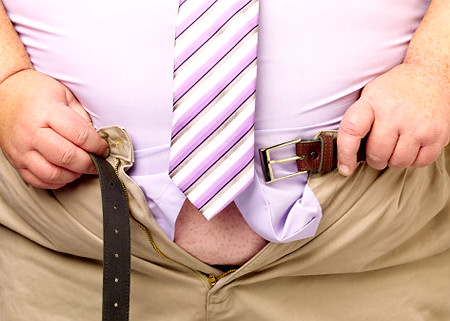 by Sean Croxton
by Sean Croxton
There’s a lot more to fat loss than meets the eye.
I’ve sat through many conferences, read hundreds of books, and spoken with countless experts about the causes of and potential solutions for our modern obesity epidemic.
Everyone has their own opinion. Some make sense. Others are overly simplistic — take the calories-in/calories-out fat loss formula, for instance. And most completely miss the point by approaching the topic with extreme tunnel vision.
In my opinion, solving problems usually calls for some lateral thinking, or what I call thinking outside of The Box. In other words, getting to the bottom of obesity requires that the conversation move beyond just diet and exercise alone.
This conversation can go in many directions. We could talk about the effects of sleep deprivation on weight gain, the role of stress in blood sugar dysregulation, or even how infections contribute to insulin resistance and thus fat storage.
But one leading cause of obesity that often gets lost in this ongoing discussion is how the abundance of toxic chemicals in our air, food, water, and even those lurking in your kitchen and bathroom cabinets are making you fat.
It is blatantly obvious that obesity has steadily risen as our food supply has become more processed and refined. I think we can all agree on that. Yet during this same period the number of chemicals in our environment has exploded in lock-step with our waistlines. For instance, in his fascinating-yet-kinda-scary book The Hundred Year Lie, author Randall Fitzgerald states that in a study conducted by the Centers for Disease Control involving 2,400 adults and children, more than two hundred synthetic chemical toxins were found in the subjects’ bodies, with a hundred more chemicals suspected to be present.
The human body was never intended to deal with this kind of chemical assault. In fact, when you think about it, your body is a highly complex machine within which literally thousands of biochemical reactions are taking place at all times. If you’ve ever taken a laboratory course in Chemistry, you know that mixing random chemicals together can be a bad idea. You never know what you’re gonna get!
According to a growing number of research scientists studying obesogens, the chemicals we inhale, eat, drink, and lather ourselves with during and after a shower are making us fat.
When it comes to fat regulation, it’s all about the hormones. Obesogens are chemicals that negatively impact the hormonal system thus triggering weight gain. At times, they are referred to as endocrine disruptors. A common example of an endocrine-disrupting chemical is a plastic bottle that leaches estrogen-mimicking substances into the body. An elevation in estrogen will certainly create the conditions for fat storage, especially in men.
But it doesn’t end with plastics — not even close. Other chemicals with obesegenic effects include bisphenol A (BPA), non-stick (Teflon) coating on cookware, the petrochemicals in common personal care products, and many more.
Bisphenol A (BPA)
BPA can be found in hard, clear plastic containers, on sales receipts, and in the linings of canned goods. It has recently found itself in the news, as research has demonstrated links between BPA and learning disabilities, cancers, and leptin resistance -— the latter being a significant factor in weight gain.
BPA also suppresses the release of adiponectin, a hormone responsible for increasing insulin sensitivity and reducing inflammation. Inhibiting adiponectin contributes to insulin resistance, which, of course, leads to fat storage. As a general rule, when insulin levels are elevated, the body is in fat storage mode.
To minimize BPA exposure be sure that you purchase canned goods that are BPA-free, avoid bottles or containers marked with a number 7, and have the cashier toss the receipt when you don’t need it.
Teflon (PFOA)
Teflon, or PFOA, is commonly found in non-stick cookware, greaseproof food wrappers, waterproofers, and popcorn bags. Research by the Environmental Working Group has found that over 90% of us have PFOA in our bloodstreams. Studies have also found high levels in umbilical cord blood. Yikes!
This chemical has been linked to various cancers, lung and kidney damage, and obesity. If you are cooking your food in non-stick cookware, you are slowly poisoning yourself daily with small amounts of PFOA. Keep this is mind if you are one those people who eats healthy but also eats out a lot. The restaurant chef is most likely using non-stick cookware!
Avoiding PFOA is a matter of investing in a set of cast iron or stainless steel cookware. If making such an investment is not in the cards for your right now, be sure to get rid of any scratched of chipped non-stick items, as they can tremendously increase the amount of PFOA in your food.
Personal Care Products
According to Fitzgerald, we use 9 personal care products daily with around 126 chemical ingredients, one-third of which have been identified as causing cancer or other serious health problems. Ouch!
Just as we should read our food labels, we should also pay mind to the chemicals in these products. No, we don’t eat or drink our shampoo or body wash (at least I hope not), but we must not forget that what we rub on our skin can be absorbed transdermally into our bloodstreams.
Toxic ingredients to be on the lookout for are propylene glycol, methyl paraben, ethyl paraben, and fragrances (because your kiwi shampoo doesn’t really have kiwi in it). These chemicals can have an estrogen mimicking effect, thus shifting hormones, storing fat, and possibly fueling tumor growth.
I encourage you to visit www.cosmeticsdatabase.com to learn just how toxic your personal care products may be. The database ranks products on a scale of 1 to 10, with 10 being the most toxic. I try to keep my products at four and below. Great brands are Aubrey Organic, J/A/S/O/N, and Alba Organics.
We’re just scratching the obesogenic surface! Additional fat-storing toxins include vinyl, most cleaning products, fire retardants (they’re everywhere), chemicals in our water supply, and more.
I cover many of these environmental toxins, how to remove them, and what to replace them with in chapter 9 of my e-book The Dark Side of Fat Loss. CLICK HERE to learn more.
Of course, none of us can live in a bubble. But what we can do is educate ourselves, become more aware of the toxins around us, and replace them with healthier options.
The next time you’re out buying a new bottle of shampoo, skip your usual toxic brand and grab its non-toxic alternative. Or invest in just one stainless steel skillet; you don’t have to buy the whole set!
Remember, a little on top of a little will soon become a lot. By making small changes today, in a matter of months you will have tremendously reduced your toxic load. Not only will feel better and live longer, but you will also burn more fat by normalizing your hormonal system.
Burning fat by eliminating toxins…
Now that’s thinking outside of The Box!
Sean Croxton


Hey Sean
Thank you for your hard work, really appreciated.
I heard your show on brain chemicals. Is it best to take the 100mg 5HTP & 1000mg Tyrosine with or without food?
Thanks Again,
Tom
Hi Sean!
Our office has been drinking water from the Arrowhead 3 gal. water dispenser for over 15years. In trying to eliminate BPA exposure, I look for the #7 on the plastic container. Much to my disappointment, I went to pour a glass of water today and saw a #7 on the plastic jug on top of the dispenser. I wrote Arrowhead and decided to follow up with a phone call today. I spoke with a customer service rep initially who told me they are aware of this issue and are in the process of converting #7 containers to #1. When I asked when I might get a #1 container to my office, she could not answer that and transferred me up to a higher authority. The woman I next spoke with, said that they are aware that their container does have a very small trace amount of BPA in it (comparable to 1:1Billion) and that the BPA does not leak into the water. I told her that was contrary to everything I had been reading about BPA leaking into food and liquids. She held firm and I suggested she e-mail the research and resources that support her assertion. She will be emailing me that information tomorrow. I emphasized that California along with 10 other states will be banning BPA from baby bottles/feeding containers the concern is so prevalent. She began to say that the baby bottles in the news are of a higher BPA. I wanted to share this with you to see what you thought/call on a higher health power to possibly analyze this. What do you think? In the meantime, I will be transporting my water from home in a stainless steel container. Thanks, Sean!
*I omitted that the second rep could not tell me when (if they are in fact in the process of converting to #1) that I could get my #7 bottles exchanged out. She also said (contrary to the previous rep) that they were not converting the bottles to #1 due to the BPA issue but that they were converting it to #1 as an easier recycling option. :/
What a great post.
With all the environmental toxins around us, our livers are forced to work overtime detoxifying our bodies, leaving us far less-equipped to do the intended job of metabolism. Hence, one more reason we’re so overweight.
With the abundance of estrogen-like toxins (such as those you mentioned), estrogen dominance has become so prevalent today…. Right along side estrogen dominance are consequences such as increased cancer rates and erectile dysfunction. Yet, due to many reasons, the “mainstream” in our society will not make that correlation. Instead, they look toward different drugs to treat those problems.
Thanks to articles like this, people are slowly getting the message…. I hope that over time, and with enough of us educating others, this discussion becomes part of mainstream.
Thanks for the great post, Sean!
BPA , which is in most canned foods, is linked to obesity and heart disease . Toxins certainly contribute to obesity. Fat cells become disregulated, and hoard.